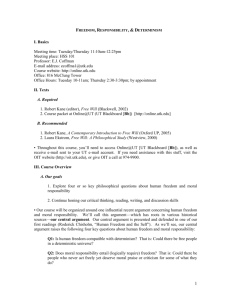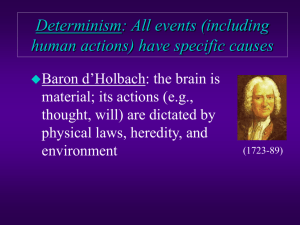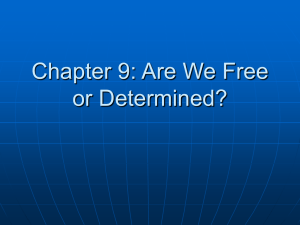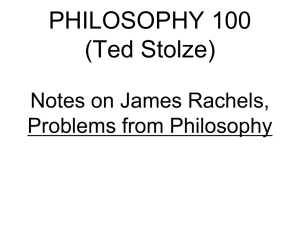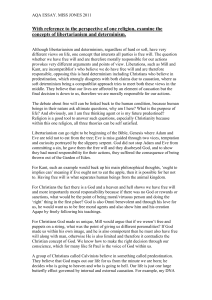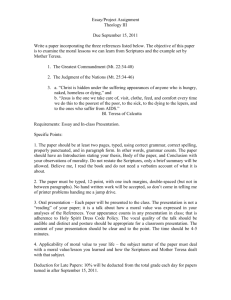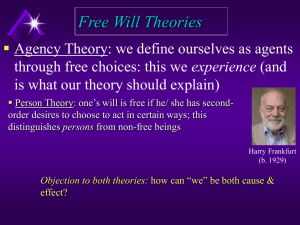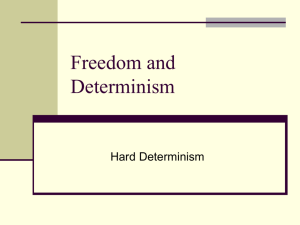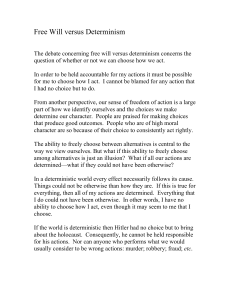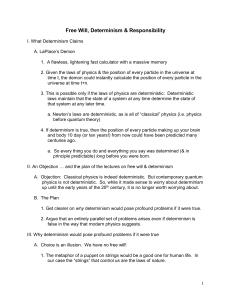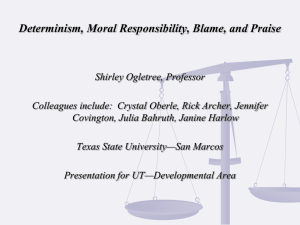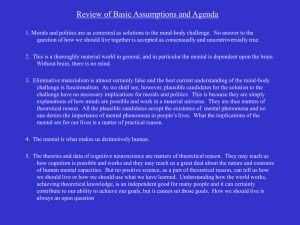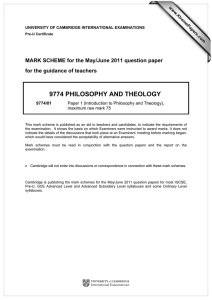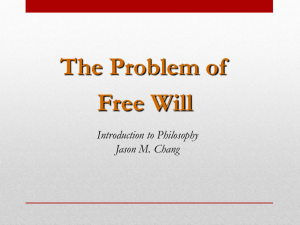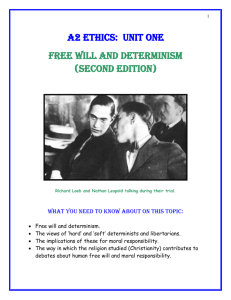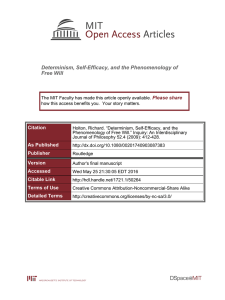AGENCY, RESPONSIBILITY, & DETERMINISM
advertisement
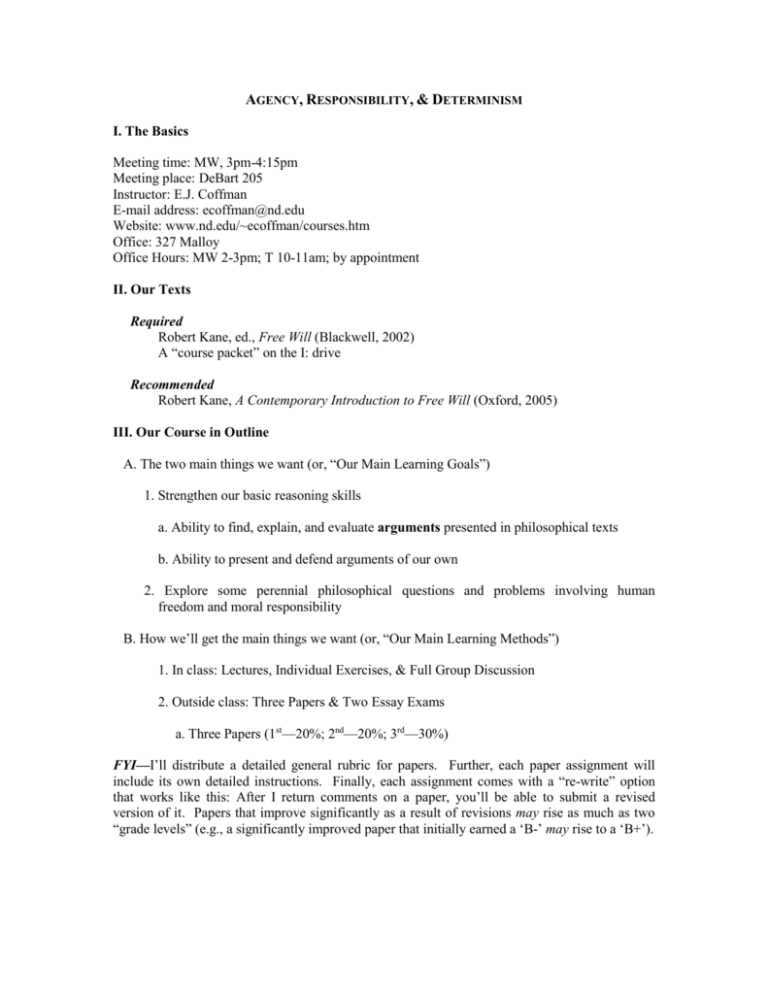
AGENCY, RESPONSIBILITY, & DETERMINISM I. The Basics Meeting time: MW, 3pm-4:15pm Meeting place: DeBart 205 Instructor: E.J. Coffman E-mail address: ecoffman@nd.edu Website: www.nd.edu/~ecoffman/courses.htm Office: 327 Malloy Office Hours: MW 2-3pm; T 10-11am; by appointment II. Our Texts Required Robert Kane, ed., Free Will (Blackwell, 2002) A “course packet” on the I: drive Recommended Robert Kane, A Contemporary Introduction to Free Will (Oxford, 2005) III. Our Course in Outline A. The two main things we want (or, “Our Main Learning Goals”) 1. Strengthen our basic reasoning skills a. Ability to find, explain, and evaluate arguments presented in philosophical texts b. Ability to present and defend arguments of our own 2. Explore some perennial philosophical questions and problems involving human freedom and moral responsibility B. How we’ll get the main things we want (or, “Our Main Learning Methods”) 1. In class: Lectures, Individual Exercises, & Full Group Discussion 2. Outside class: Three Papers & Two Essay Exams a. Three Papers (1st—20%; 2nd—20%; 3rd—30%) FYI—I’ll distribute a detailed general rubric for papers. Further, each paper assignment will include its own detailed instructions. Finally, each assignment comes with a “re-write” option that works like this: After I return comments on a paper, you’ll be able to submit a revised version of it. Papers that improve significantly as a result of revisions may rise as much as two “grade levels” (e.g., a significantly improved paper that initially earned a ‘B-’ may rise to a ‘B+’). i. 1st paper (20%) a. Main tasks i. Reconstruct an argument encountered in an assigned reading ii. Defend the argument against an objection described in the assignment b. 3-4 pages ii. 2nd paper (20%) a. Main tasks i. Reconstruct an argument encountered in an assigned reading ii. Develop an original objection to the argument b. 3-4 pages iii. 3rd paper (30%; builds on 2nd paper) a. Main tasks i. Explain a possible reply to the objection you developed in your 2nd paper ii. Critically evaluate the possible reply b. 5-7 pages c. Two Essay Exams (15% each) FYI—Each exam will consist of two essay questions drawn from a list of several possible questions. The possible questions will derive entirely from material covered in class. I’ll distribute a list of questions several days before each exam. I’ll also facilitate an optional review session a few days before each exam. i. Mid-term: Wednesday, March 7th, 3-4.15pm ii. Final: Tuesday, May 8th, 4.15-6.15pm IV. Tentative Reading Schedule (RK = Robert Kane’s Free Will anthology; I: = the paper is in our course’s I: drive folder) Reviewing Basic Reasoning Skills & Introducing the Main Problem E.J. Coffman, “Some Basic Reasoning Skills” [I:] Jim Pryor, “Philosophical Terms & Methods” [I:] Hugh Lafollette, “Reading Philosophy” [I:] Jim Pryor, “Guidelines on Reading Philosophy” [I:] Roderick Chisholm, “Human Freedom and the Self” [RK] Does Moral Responsibility Require Freedom? Peter van Inwagen, brief excerpt from An Essay on Free Will [handout] Thomas Nagel, “Moral Luck” [I:] Harry Frankfurt, “Alternate Possibilities and Moral Responsibility” [I:] John Martin Fischer, “Frankfurt-style Examples, Responsibility & Semi-compatibilism” [RK] Derk Pereboom, “The Explanatory Irrelevance of Alternative Possibilities” [RK] Is Freedom Compatible with Determinism? Peter van Inwagen, “The Incompatibility of Free Will and Determinism” [I:] Kai Nielson, “The Compatibility of Freedom and Determinism” [RK] Daniel Dennett, “I Could Not Have Done Otherwise—So What?” [RK] Harry Frankfurt, “Freedom of the Will and the Concept of a Person” [RK] Gary Watson, “Free Agency” [I:] Susan Wolf, “Sanity and the Metaphysics of Responsibility” [RK] Is Freedom Compatible with Indeterminism? Peter van Inwagen, “The Mystery of Metaphysical Freedom” [RK] Alfred Mele, TBA [I:] Skepticism about Freedom and Moral Accountability Paul Edwards, “Hard and Soft Determinism” [RK] Galen Strawson, “The Impossibility of Moral Responsibility” [I:] Some Related Fun Stuff Divine Foreknowledge and Human Freedom St. Augustine, “Divine Foreknowledge, Evil, and the Free Choice of the Will” [RK] William Hasker, “God, Time, Knowledge and Freedom: The Historical Matrix” [RK] Brain Science and Human Freedom Walter Glannon, “Neurobiology, Neuroimaging, and Free Will” [I:]
